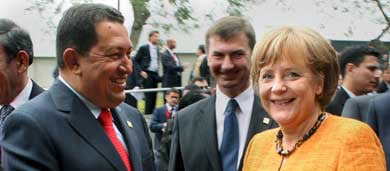Merkel is the third German politician to receive the prestigious medal, hand crafted from solid gold, joining past Chancellors Ludwig Erhard (CDU) and Willy Brandt (SPD).
Merkel is one of 27 European representatives of industry and commerce attending the Lima Summit this month along with 33 South American leaders, to discuss EU and Latin American relations.
The German Chancellor has proved to be a prominent representative of Europe at the conference, despite controversial remarks from Venezuelan leader Hugo Chavez, who recently claimed that Merkel was a political descendent of Hitler.
In a turn around Chavez offered his hand to Merkel in front of the National museum of Lima on Friday, warmly greeting her and offering his apologies.
“I have told the German chancellor, if I was too hard on you please forgive me. I offer you my hand.” Chavez later explained, reported German daily Der Tagesspiegel.
Merkel accepted the Venezuelan’s hand shake, but was eager to focus on the main issues of how the two continents can work together to fight poverty and climate change.
One major concern is the unrivaled production of biofuels in South America that could have drastic effects on the Amazon rain forest. As one of the planet’s largest CO2 reducing areas, plans to clear parts of the rain forest worry world leaders, as the plants’ reduction of global CO2 levels would be greatly effected.
Merkel hopes the Summit will be a chance to develop relations between the 60 cities of the EU and Latin America attending the Lima meeting.
“It’s a chance for the two continents to move closer to each other,” she said before her trip to Lima.
This years’ Lima summit was the fifth time that representatives of the European Union and Latin America have met.
The EU invests approximately €500 million in the South American continent each year.




 Please whitelist us to continue reading.
Please whitelist us to continue reading.